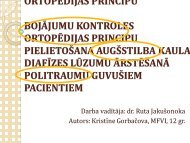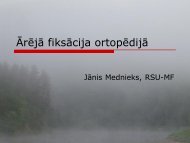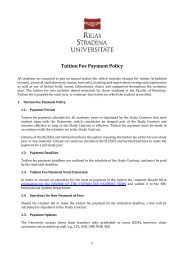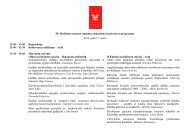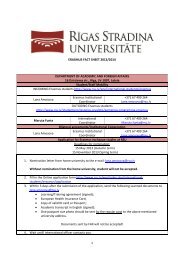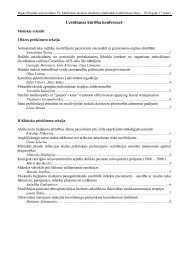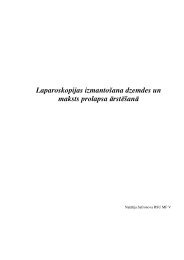History of Latvia: a Brief Survey
History of Latvia: a Brief Survey
History of Latvia: a Brief Survey
- No tags were found...
Create successful ePaper yourself
Turn your PDF publications into a flip-book with our unique Google optimized e-Paper software.
The first 1000 <strong>Latvia</strong>n men conscripted for military service in the German army (<strong>Latvia</strong>n Legion) on29 March 1943.<strong>Latvia</strong>’s population perished not only on the battlefield. During the years <strong>of</strong> Nazi occupation,special campaigns exterminated approximately 70 000 Jews, 18 000 <strong>Latvia</strong>ns and 2 000 Roma— in total about 90 000 people. In the case <strong>of</strong> the <strong>Latvia</strong>ns, these were mostly civilians whosepolitical convictions were unacceptable to the German occupation force. Jewish and Romacivilians were eliminated as a result <strong>of</strong> the inhuman Nazi theory <strong>of</strong> racial purity. A majority<strong>of</strong> <strong>Latvia</strong>n Jewry had been murdered by late 1941, when it is estimated that there were onlyaround 6000 Jews remaining in <strong>Latvia</strong>.A draft order into the so-called ‘<strong>Latvia</strong>nSS Volunteer Legion’, summer <strong>of</strong> 1943.Many <strong>Latvia</strong>ns were actively involved in a resistance movement against the persecutions <strong>of</strong>the German occupation regime. For instance, Žanis Lipke (1900-1987) risked his life to savemore than 50 Jews. Civic circles in <strong>Latvia</strong> were also dissatisfied with the German occupationregime and secretly plotted to reinstate a democracy. In order to carry out the plan forindependence, an underground organisation was established, the <strong>Latvia</strong>n Central Council,which published the outlawed publication Brīvā Latvija (‘Free <strong>Latvia</strong>’). This notably democraticperiodical propagated the idea <strong>of</strong> renewing democracy in <strong>Latvia</strong> after the war.36Žanis Lipke (1900-1987)Nazi Germany began to suffer regular defeats on the eastern front and was pushed backto the west. In mid-July 1944, the Soviet Army once again crossed <strong>Latvia</strong>’s pre-war easternborder, and by 13 October had already invaded Rīga. In mid-October the German army, whichpartly also included former soldiers from the <strong>Latvia</strong>n Legion, was besieged in Kurzeme. Atthat time, Kurzeme was flooded with refugees from eastern <strong>Latvia</strong> who were fleeing Sovietrule, the Red Army and persecution. With no other reprieve in sight, many fled in fishermen’sboats and ships to Sweden and Germany, from where they drifted to various parts <strong>of</strong> theWestern world (mainly North America and Australia). Approximately 150 000 <strong>Latvia</strong>ns endedup in exile in the West.



